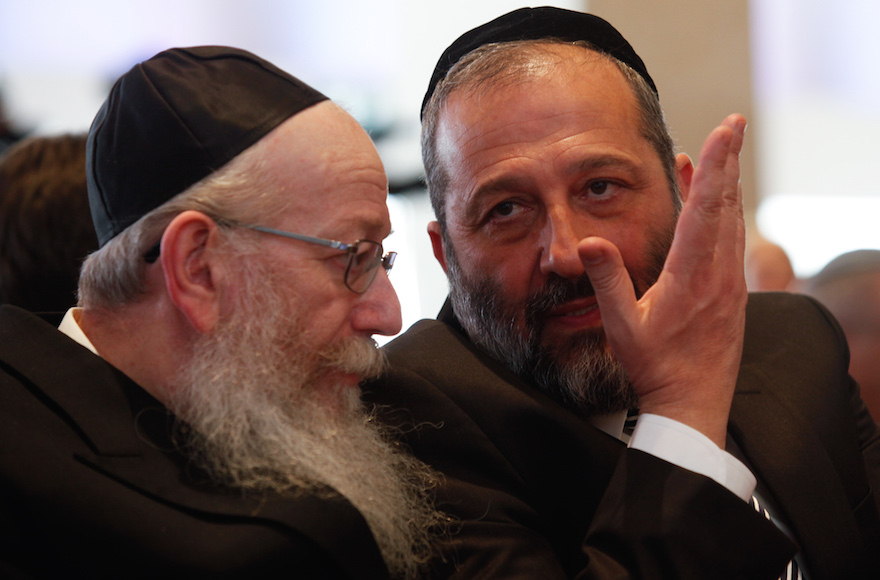5 things to know about Israel’s failed conversion reform
Published July 7, 2015

Shas party leader Aryeh Deri, right, speaks with United Torah Judaism leader Yaakov Litzman at the opening session of the 20th Knesset on March 31, 2015. (Nati Shohat/Flash90)
The Israeli government last November passed a landmark decision that eased the path to conversion for about 400,000 Israelis not considered Jewish by Israel’s Chief Rabbinate. The reform allowed some 30 Orthodox city rabbis to perform state-recognized conversions in Israel — an increase from four rabbinate-controlled courts. The law aimed to create more flexible standards within the bounds of Orthodox conversion.
Israel’s haredi political parties opposed the move, as it weakened the Chief Rabbinate. Now part of Israel’s governing coalition, they pushed through a government reversal of the decision, returning to the pre-November status quo. Here are five things you need to know about the decision and its reversal.
1. The repealed decision aimed to ease conversions for hundreds of thousands of non-Jewish Israelis
Before Israel’s previous government passed the decision last November, Israelis wishing to convert to Orthodox Judaism could do so only in one of four courts run by the Israeli Chief Rabbinate. That meant prospective converts had to acquiesce to strict and often arduous conversion standards, like proving Jewish ancestry a few generations back or committing to send their children to an Orthodox school.
The government decision, approved by a cabinet vote, gave some 30 Israeli Orthodox city rabbis the power to perform conversions — including some, like American-born Efrat Chief Rabbi Shlomo Riskin, who are on the liberal end of Orthodoxy. The decision was aimed at an estimated 400,000 Israelis, mostly Russian-speaking, who immigrated to Israel under the Law of Return but who aren’t Jewish according to Orthodox Jewish law. The decision intended to provide more flexibility in Israel’s conversion standards, and to give those Israelis more freedom of choice should they choose to perform the ceremony.
2. Haredi parties opposed it because it weakened the Chief Rabbinate
Israel’s haredi Orthodox political parties — Shas and United Torah Judaism — opposed the decision because it broke the haredi-dominated Chief Rabbinate’s monopoly over conversion standards. Left out of Israel’s previous government, the parties were unable to block the decision.
But once Shas and UTJ entered the current Israeli coalition in May, they set about reversing the decision. The effort is part of a larger rollback of religious reforms advanced by secularist and modern Orthodox lawmakers during the past two years. The coalition agreement between Likud and UTJ promised to return Israel’s religious law to its pre-2013 status-quo, and this week, the government made good on that promise, reversing the decision.
The measure was first introduced as a proposed law, which would have needed to go through a lengthy process of Knesset votes to be passed. After that process kept being postponed last year, Israel’s coalition pushed the reform through as a government decision, which only needs a majority of the cabinet’s approval. But that means that a simple cabinet majority could reverse it as well — which is what happened Sunday.
3. The decision’s supporters don’t have many options now
Israeli religious pluralism advocates called the previous, haredi-less government a “window of opportunity.” That window shut firmly with the Likud-UTJ agreement, which conceded to all of the haredi parties’ demands.
Israeli pluralism organizations can always try to overturn the law in court. In past similar situations, groups have submitted petitions claiming that religious restrictions contravene Israel’s law on human dignity and freedom. Such a court case, however, could take years, and would take longer to implement even if the court declared the current regulations invalid.
Given Israel’s tumultuous political history, an election in the next few years is far more likely. So for proponents of conversion reform, the best bet is to rally public support for a change and hope the vote swings their way next time.
4. Most Jewish Israelis support a change to conversion law
The good news, for conversion reform supporters, is that the public is on their side. Successive polls have shown majorities of Israelis support religious policy reform — including on conversion. A 2014 poll by Hiddush, which advocates for religious pluralism in Israel, found that 64 percent of Israelis wanted Israel to recognize Conservative and Reform conversions as well as Orthodox ones.
And after the election results made clear that haredi parties would join the government, Hiddush found that 62 percent of Jewish Israelis preferred a government without haredi parties.
5. This doesn’t affect Conservative and Reform conversions either way
One thing needs to be made clear: The government decision from last year did not affect the status of non-Orthodox conversions at all. It was simply an expansion of state-recognized Orthodox conversions. Conservative and Reform ceremonies remained unrecognized then, and they still aren’t recognized now.
So when non-Orthodox leaders condemn the reversal of the reform, they do so more out of opposition to the rabbinate’s monopoly over religious services than because the law was a game-changer for them. Yizhar Hess, CEO of Israel’s Conservative movement, wrote on Facebook Sunday that the decision is a sign of the rabbinate’s “weakness, not its longevity.” Had the rabbinate felt secure in its standing, he wrote, it would not have felt threatened by the reform.
This entry passed through the Full-Text RSS service – if this is your content and you’re reading it on someone else’s site, please read the FAQ at fivefilters.org/content-only/faq.php#publishers.















